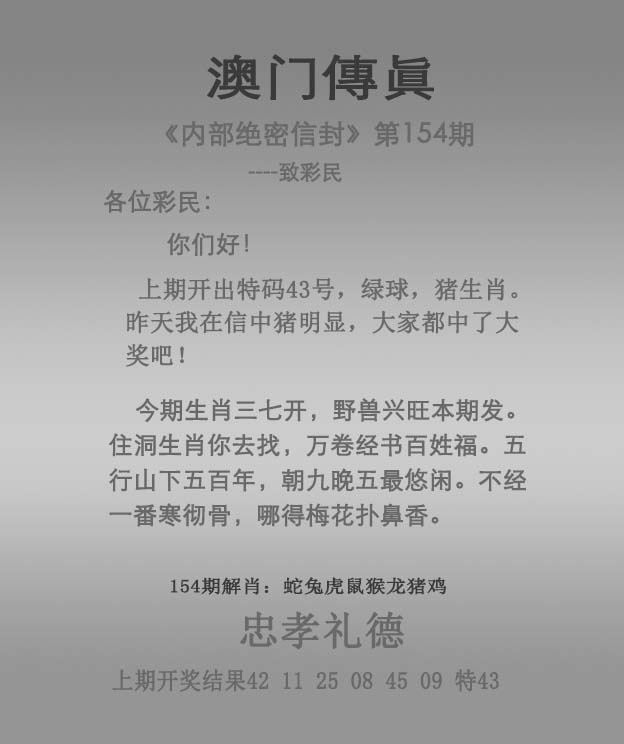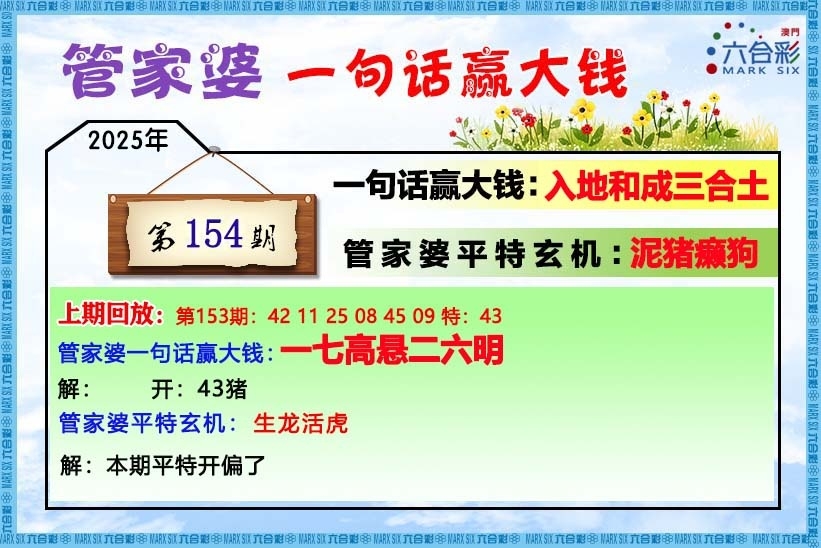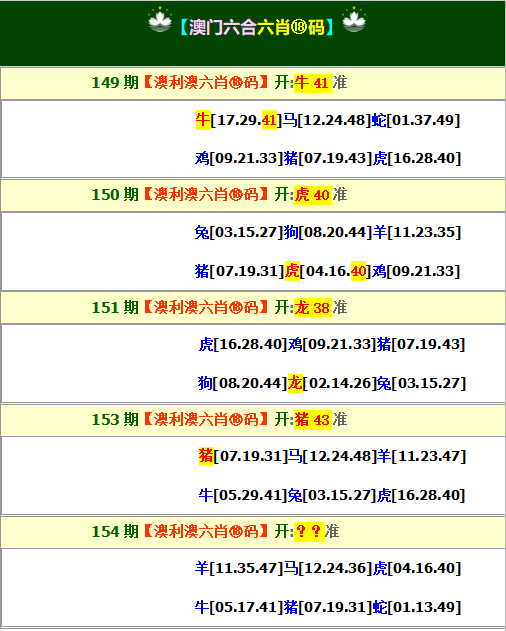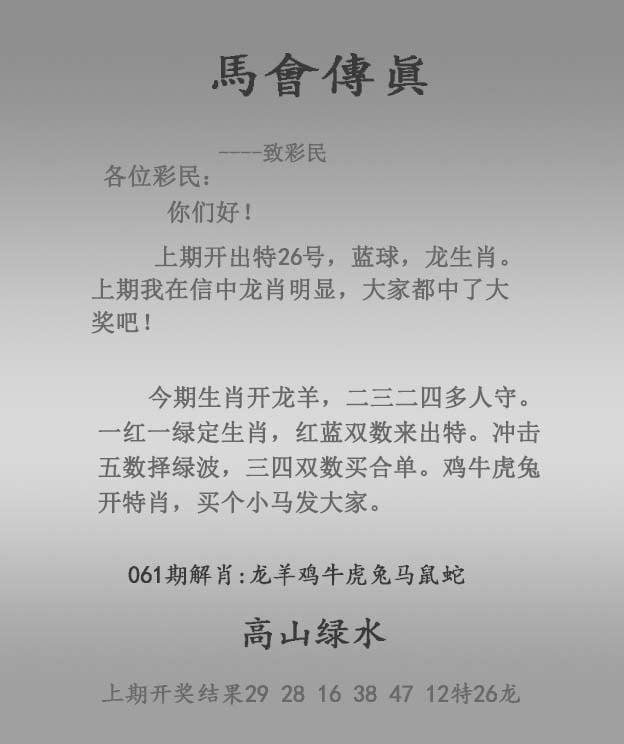
|
154期 | |
|---|---|---|
| 挂牌 | 25 | |
| 火烧 | 羊 | |
| 横批 | 二桃三士 | |
| 门数 | 04,02 | |
| 六肖 | 鸡狗牛鼠猴龙 | |
- 154期:【贴身侍从】必中双波 已公开
- 154期:【过路友人】一码中特 已公开
- 154期:【熬出头儿】绝杀两肖 已公开
- 154期:【匆匆一见】稳杀5码 已公开
- 154期:【风尘满身】绝杀①尾 已公开
- 154期:【秋冬冗长】禁二合数 已公开
- 154期:【三分酒意】绝杀一头 已公开
- 154期:【最爱自己】必出24码 已公开
- 154期:【猫三狗四】绝杀一段 已公开
- 154期:【白衫学长】绝杀一肖 已公开
- 154期:【满目河山】双波中 已公开
- 154期:【寥若星辰】特码3行 已公开
- 154期:【凡间来客】七尾中特 已公开
- 154期:【川岛出逃】双波中特 已公开
- 154期:【一吻成瘾】实力五肖 已公开
- 154期:【初心依旧】绝杀四肖 已公开
- 154期:【真知灼见】7肖中特 已公开
- 154期:【四虎归山】特码单双 已公开
- 154期:【夜晚归客】八肖选 已公开
- 154期:【夏日奇遇】稳杀二尾 已公开
- 154期:【感慨人生】平特一肖 已公开
- 154期:【回忆往事】男女中特 已公开
- 154期:【疯狂一夜】单双中特 已公开
- 154期:【道士出山】绝杀二肖 已公开
- 154期:【相逢一笑】六肖中特 已公开
- 154期:【两只老虎】绝杀半波 已公开
- 154期:【无地自容】绝杀三肖 已公开
- 154期:【凉亭相遇】六肖中 已公开
- 154期:【我本闲凉】稳杀12码 已公开
- 154期:【兴趣部落】必中波色 已公开
| 154期:澳门天天好彩AA级公开; 还等啥大胆砸 |
|---|
| 154期:精选九肖:鸡兔鼠牛龙蛇猴马虎 |
| 154期:精选六肖:鸡兔鼠牛龙蛇 |
| 154期:精选四肖:鸡兔鼠牛 |
| 154期:精选三肖:鸡兔鼠 |
| 154期:精选二肖:鸡兔 |
| 154期:精选一肖:鸡 |
| 154期:精选尾数:5.7.3.8.1 |
| 154期:家禽野兽:家禽 |
| 154期:平特一肖:单数 |
| 154期:精选十码:09.21.15.18.29.14.37.34.24.28 |
| 154期:精选五码:09.21.15.18.29 |
| 154期:精选三码:09.21.15 |
| 六合活动进行中:站长担保 点击投注 |
| 154期:精选一码:重拳出击-09-信心十足 |
| 153期:澳门天天好彩AA级公开; 还等啥大胆砸 |
|---|
| 153期:精选九肖:猴马鼠虎羊兔狗猪牛 |
| 六合活动进行中:站长担保 点击投注 |
| 152期:澳门天天好彩AA级公开; 还等啥大胆砸 |
|---|
| 152期:精选九肖:猴马鼠虎羊兔狗猪牛 |
| 152期:精选六肖:猴马鼠虎羊兔 |
| 152期:精选四肖:猴马鼠虎 |
| 152期:精选三肖:猴马鼠 |
| 152期:精选二肖:猴马 |
| 152期:精选一肖:猴 |
| 152期:精选尾数:0.4.9.6.8 |
| 152期:家禽野兽:野兽 |
| 152期:平特一肖:双数 |
| 六合活动进行中:站长担保 点击投注 |
- 澳门四不像精解
- 香港四不像精解

154期今期羊鸡虎出特,六间三推说一二开?00准
①杀马龙狗(12.24.36.48.02.14.26.38.08.20.32.44)
②图解特肖羊鸡虎蛇猪
③合单+小数
更多资料尽在新澳门开奖结果2025开奖记录
153期今期狗猪蛇出特,凤凤山上二六笑开猪43准
①杀鸡鼠牛(09.21.33.45.06.18.30.42.05.17.29.41)
②图解特肖狗猪蛇虎兔
③合单+大数
更多资料尽在新澳门开奖结果2025开奖记录
- 澳门平特心水
- 香港平特心水
154期平猴→猴猪(2连)→猴猪鼠(3连)
153期平羊→羊鼠(2连)→羊鼠牛(3连)
- 澳门传真
- 香港传真

澳门传真154期
解:此签暗喻机遇与挑战并存,三七开指三分靠运气,七分靠努力。野兽兴旺象征强者得势,住洞生肖需主动探寻机遇。五行山下喻忍耐积累,朝九晚五是踏实耕耘,末句强调成功必经磨砺。【生肖喻义】虎(野兽称雄,强势发迹)兔(住洞藏机,静待良时)龙(五行山下,潜龙勿用)马(朝九晚五,稳中求进)猴(万卷经书,灵慧致富)鸡(寒彻骨后,晨鸣得福)狗(忠诚守业,终得厚报)——生肖揭示:强者顺势、智者寻机、耐者成事,苦尽方有甘来
七肖:虎兔龙马猴鸡狗
五肖:虎兔龙马猴
三肖:虎兔龙
主特:16.28.15.27.14.26.36.34.09.08
更多资料尽在新澳门开奖结果2025开奖记录
澳门传真152期
解:今期生肖三四开(3+4=7,指兔、龙、蛇、马、羊、猴、鸡七生肖);五更打鸣(鸡司晨,天将亮);男儿有志(如虎闯四方);不信掉馅饼(鼠偷巧终败);有胆识(马奔前程);做榜样(龙威引领);后辈防骄(猴聪反被误)。生肖警世:兔(机巧)、龙(权威)、蛇(隐忍)、马(奋进)、猴(灵变)、鸡(守时)、鼠(戒贪)——成事在勤,戒躁防骄
七肖:兔龙蛇马羊猴鸡
五肖:兔龙蛇马羊
三肖:兔龙蛇
主特:15.27.14.26.25.37.36.35.34.09
更多资料尽在新澳门开奖结果2025开奖记录
澳门传真149期
解:二七开指生肖排第2的牛和第7的马;夏日火烧对应暴躁的午马(火)与憨牛(耐劳);落井下石讽鼠蛇阴险;阴凉避暑喻兔羊温顺躲闲;二一少女(12岁属鼠)卖瓜,鼠机灵善营;馋嘴娃是贪吃的猪;绿豆汤解暑,龙(水)调和阴阳。【生肖表达】鼠(机灵贩瓜)、牛(耐热耕耘)、兔(树荫乘凉)、龙(煮汤降火)、蛇(暗算心黑)、马(烈日躁动)、猪(馋食瓜果)——暑气炎炎,众生百态
七肖:鼠牛兔龙蛇马猪
五肖:鼠牛兔龙蛇
三肖:鼠牛兔
主特:06.18.05.17.15.27.26.37.12.19
更多资料尽在新澳门开奖结果2025开奖记录
澳门传真148期
解:这首谜语暗藏生肖线索:“四五开”(4+5=9,第9位是猴)“美女肖”(蛇妖娆,兔柔美,取蛇)“三二五门”(3+2+5=10,第10位是鸡)“表里不一”(龙威严却善变)“相冲生肖”(鼠马相冲,取马)“人善被欺”(羊温顺易受欺)“三餐吃饱”(猪象征富足懒散)生肖:猴、蛇、鸡、龙、马、羊、猪
七肖:猴蛇鸡龙马羊猪
五肖:猴蛇鸡龙马
三肖:猴蛇鸡
主特:34.46.25.37.09.21.14.36.35.19
更多资料尽在新澳门开奖结果2025开奖记录
澳门传真147期
解:这段文字融合了生肖数字谜题与人生哲理,通过数字与生肖的象征意义传递处世智慧。解释:“二三开,一六倒合开三八”:指数字组合的生肖特性,如“二三”可能象征合作(如虎的魄力+兔的细腻),“一六倒合”暗示灵活应变(如鼠的机敏),“三八”代表时机把握(如龙的决断力)1。“夫妻本是同林鸟”:比喻关系易变,需稳固(如狗的忠诚或马的奔放自由)7。“降数靠四五”:可能指依赖稳定力量(如牛的坚韧或羊的温和)。“三七二一好兄弟”:象征协作(如猴的机智+鸡的严谨)。“遇人不淑…心气爽”:强调逆境破局(如虎的勇猛或马的果断)3。生肖表达:鼠(灵活“一六倒合”)牛(稳定“四五”)虎(破局“起一消二”)龙(掌控“三八”)马(自由奔放)猴(协作“三七二一”)狗(忠诚“同林鸟”)整体暗喻人生需平衡机敏、坚韧、果敢与协作,方能化解困境
七肖:鼠牛虎龙马猴狗
五肖:鼠牛虎龙马
三肖:鼠牛虎
主特:06.18.05.17.16.28.26.36.34.08
更多资料尽在新澳门开奖结果2025开奖记录
- 澳门五肖十码
- 香港五肖十码
154期推荐⑤肖:鼠鸡猴龙马
154期推荐③肖:鼠鸡猴
154期推荐⑩码:18.30.09.21.34.46.14.26.24.36
154期推荐⑤码:18.30.09.21.34
更多资料尽在新澳门开奖结果2025开奖记录
- 澳门红字肖
- 香港红字肖
154期红字暗码【狗吠之惊】【07 18 33 40】
解析:意为比喻微小的惊吓或惊扰,特指类似盗贼侵扰的小规模动荡。解鼠马牛狗羊兔
解取特肖:鼠马牛狗羊兔
解取五肖:鼠马牛狗羊
解取四肖:鼠马牛狗
153期红字暗码【狡兔三窟】【08 21 36 49】
解析:原指狡猾的兔子会准备多个洞穴来躲避危险,现比喻为防身避祸预先做好多手准备。解兔鸡狗羊蛇猪
解取特肖:兔鸡狗羊蛇猪
解取五肖:兔鸡狗羊蛇
解取四肖:兔鸡狗羊
- 澳门平五不中
- 香港平五不中
154期【04.10.01.11.34】?
- 澳门传真20码
- 香港传真20码
154期澳门内幕传真20码开?00
特码玄机:309 279(兔39)21+06= ?
土在跟上金在后,大闹天宫追二郎
提供20码:
34 02 14 35 18 01 28 40 32 25
22 36 27 49 46 13 39 05 26 08
- 澳门精准单双
- 香港精准单双
154期精准单双〖单数〗开:?00准
153期精准单双〖单数〗开:猪43准
- 澳门玄机诗
- 香港玄机诗
154期【澳彩玄机诗】
山林秋风至,识途归不迟:开?00
解:
153期【澳彩玄机诗】
轻轻溪中行,望向远方去:开猪43
解:特码开猪43
152期【澳彩玄机诗】
礼义教子弟,凶恶训儿郎:开猴10
解:特码开猴10
151期【澳彩玄机诗】
双雄争天下,纷飞女上阵:开龙38
解:特码开龙38
150期【澳彩玄机诗】
佳丽三四千,下棋和弹琴:开虎40
解:特码开虎40
- 澳门跑狗图
- 香港跑狗图

154期跑狗一字記之曰:【達】
路径半彎,曲在轉灘,踏步通途往返
竹子直插,人心狭窄,專一並茂發達
解:前句比喻人生如蜿蜒山路,需在转折处谨慎(如蛇之灵活);后句以竹喻人——若心胸狭窄(如鼠目光短浅),则难成事,唯有专注(如牛之踏实、马之奔放、虎之魄力)才能昌达。【生肖演绎】蛇:路径半弯,灵活绕险鼠:人心狭窄,困于短视牛:专一耕耘,终得通途马:直奔目标,并茂发达虎:魄力破局,不惧转滩
五肖:蛇鼠牛马虎
四肖:蛇鼠牛马
三肖:蛇鼠牛
二肖:蛇鼠
一肖:蛇
152期跑狗一字記之曰:【望】
高山仰止,可望難即。滿天神佛何處覓
法相干變,形形色色。近在眼前人不識
解:高山仰止象征崇高却难以触及的境界(如龙腾九霄,凡人难近);满天神佛暗喻真理看似遥远(猴机灵求索,仍不得门径);法相千变指表象迷惑(蛇蜕皮幻形,障人慧眼);而真道其实近在眼前(牛踏实耕耘中见禅意,狗忠诚守护即是修行),只是众生不识。生肖喻:龙(渺远难及)猴(妄求外相)蛇(执迷幻变)牛(朴实处真)狗(平常是道)——褪尽繁华,方见本心
五肖:龙猴蛇牛狗
四肖:龙猴蛇牛
三肖:龙猴蛇
二肖:龙猴
一肖:龙
151期跑狗一字記之曰:【荡】
天馬行空,自由奔放,翱翔萬里無風浪
越過障礙,無視教唆,片言复字誰可擋
解:这首谜语强调自由不羁、勇猛无畏、智慧超群的特质,可用十二生肖中的 马、龙、虎、猴、狗 来诠释:“天马行空,自由奔放”——直接对应 马(洒脱无拘);“翱翔万里”——象征 龙(腾飞九天,无惧风浪);“越障碍,无视教唆”——虎(勇猛果敢,冲破阻碍);“片言复字谁可挡”——猴(机敏善辩,智慧过人);“忠诚无畏”——暗指 狗(坚定信念,不受干扰)。这五生肖最能体现豪迈、智慧、自由的精神,排除温顺或保守的生肖(如牛、羊、兔等)
五肖:马龙虎猴狗
四肖:马龙虎猴
三肖:马龙虎
二肖:马龙
一肖:马
- 澳门绝杀三只
- 香港绝杀三只
154期绝杀三只【鸡羊马】开?00准
153期绝杀三只【鸡牛马】开猪43准
152期绝杀三只【狗蛇猪】开猴10准
150期绝杀三只【鸡龙猪】开虎40准
148期绝杀三只【鸡牛猴】开龙02准
147期绝杀三只【牛虎羊】开狗32准
146期绝杀三只【兔羊猴】开龙14准
- 澳门藏宝图
- 香港藏宝图

154期平特藏宝图玄机
【今期生肖定猴开】
解:今期生肖定猴开,平特猴马
特码范围评估:01-29
推荐平码:17.29.07.03.09.20
开奖结果:00-00-00-00-00-00T00
153期平特藏宝图玄机
【绿波今期有特码】
解:绿波今期有特码,平特鼠虎
特码范围评估:01-18
推荐平码:18.19.17.11.09.10
开奖结果:42-11-25-08-45-09T43
152期平特藏宝图玄机
【牛龙蛇狗定中奖】
解:牛龙蛇狗定中奖,平特牛龙
特码范围评估:02-09
推荐平码:18.19.17.11.09.10
开奖结果:09-34-17-29-35-12T10
151期平特藏宝图玄机
【今期生肖带红花】
解:今期生肖带红花,平特兔狗
特码范围评估:01-19
推荐平码:18.17.19.03.29.10
开奖结果:29-49-26-25-35-39T38
150期平特藏宝图玄机
【今期生肖找包公】
解:今期生肖找包公,平特龙虎
特码范围评估:02-18
推荐平码:18.27.09.03.19.10
开奖结果:24-43-18-31-45-12T40



154期小小分析:这段描述暗喻困境中的不同态度——小羊(未羊)消极焦虑,而小狗(戌狗)冷静谋求出路。能否脱困,需借他者之力与智慧。【生肖演绎】鼠(子):钻洞探查,为小狗指路虎(寅):威吓狱卒,制造混乱兔(卯):传递工具,暗中协助龙(辰):呼风引雷,扰乱视线蛇(巳):缠锁解钥,智破牢门马(午):疾驰接应,突围护送猴(申):模仿狱卒,调虎离山——最终小狗借势破局,而小羊布偶中竟藏逃生地图(贵人暗中相助)
综合特肖:鼠虎兔龙蛇马猴
主攻四肖:鼠虎兔龙
主攻特码:06.18.16.28.15.27.38.37.24.34
- 澳门四不像
- 澳门传真图
- 澳门跑马图
- 新挂牌彩图
- 另版跑狗图
- 老版跑狗图
- 澳门玄机图
- 玄机妙语图
- 六麒麟透码
- 平特一肖图
- 一字解特码
- 新特码诗句
- 四不像玄机
- 小黄人幽默
- 新生活幽默
- 30码中特图
- 澳门抓码王
- 澳门天线宝
- 澳门一样发
- 曾道人暗语
- 鱼跃龙门报
- 无敌猪哥报
- 特码快递报
- 一句真言图
- 新图库禁肖
- 三怪禁肖图
- 正版通天报
- 三八婆密报
- 博彩平特报
- 七肖中特报
- 神童透码报
- 内幕特肖B
- 内幕特肖A
- 内部传真报
- 澳门牛头报
- 千手观音图
- 梦儿数码报
- 六合家宝B
- 合家中宝A
- 六合简报图
- 六合英雄报
- 澳话中有意
- 彩霸王六肖
- 马会火烧图
- 狼女侠客图
- 凤姐30码图
- 劲爆龙虎榜
- 管家婆密传
- 澳门大陆仔
- 传真八点料
- 波肖尾门报
- 红姐内幕图
- 白小姐会员
- 白小姐密报
- 澳门大陆报
- 波肖一波中
- 庄家吃码图
- 发财波局报
- 36码中特图
- 澳门男人味
- 澳门蛇蛋图
- 白小姐救世
- 周公玄机报
- 值日生肖图
- 凤凰卜封图
- 腾算策略报
- 看图抓码图
- 神奇八卦图
- 新趣味幽默
- 澳门老人报
- 澳门女财神
- 澳门青龙报
- 财神玄机报
- 内幕传真图
- 每日闲情图
- 澳门女人味
- 澳门签牌图
- 澳六合头条
- 澳门码头诗
- 澳门两肖特
- 澳门猛虎报
- 金钱豹功夫
- 看图解特码
- 今日闲情1
- 开心果先锋
- 今日闲情2
- 济公有真言
- 四组三连肖
- 金多宝传真
- 皇道吉日图
- 澳幽默猜测
- 澳门红虎图
- 澳门七星图
- 功夫早茶图
- 鬼谷子爆肖
- 观音彩码报
- 澳门不夜城
- 挂牌平特报
- 新管家婆图
- 凤凰天机图
- 赌王心水图
- 佛祖禁肖图
- 财神报料图
- 二尾四码图
- 东成西就图
- 12码中特图
- 单双中特图
- 八仙指路图
- 八仙过海图
- 正版射牌图
- 澳门孩童报
- 通天报解码
- 澳门熊出没
- 铁板神算图
- 杀料专区
- 独家资料
- 独家九肖
- 高手九肖
- 澳门六肖
- 澳门三肖
- 云楚官人
- 富奇秦准
- 竹影梅花
- 西门庆料
- 皇帝猛料
- 旺角传真
- 福星金牌
- 官方独家
- 贵宾准料
- 旺角好料
- 发财精料
- 创富好料
- 水果高手
- 澳门中彩
- 澳门来料
- 王中王料
- 六合财神
- 六合皇料
- 葡京赌侠
- 大刀皇料
- 四柱预测
- 东方心经
- 特码玄机
- 小龙人料
- 水果奶奶
- 澳门高手
- 心水资料
- 宝宝高手
- 18点来料
- 澳门好彩
- 刘伯温料
- 官方供料
- 天下精英
- 金明世家
- 澳门官方
- 彩券公司
- 凤凰马经
- 各坛精料
- 特区天顺
- 博发世家
- 高手杀料
- 蓝月亮料
- 十虎权威
- 彩坛至尊
- 传真內幕
- 任我发料
- 澳门赌圣
- 镇坛之宝
- 精料赌圣
- 彩票心水
- 曾氏集团
- 白姐信息
- 曾女士料
- 满堂红网
- 彩票赢家
- 澳门原创
- 黃大仙料
- 原创猛料
- 各坛高手
- 高手猛料
- 外站精料
- 平肖平码
- 澳门彩票
- 马会绝杀
- 金多宝网
- 鬼谷子网
- 管家婆网
- 曾道原创
- 白姐最准
- 赛马会料
广告智能联播云平台(www.51cjzb.com),我们为企业提供全场景广告解决方案,2025新澳正版今晚资料,新澳2025精准正版免费,2025新澳精准正版免费大全,2025今晚必出三肖,2025新澳门天天精准免费大全,行业领先的智能广告投放与管理系统,集多渠道广告联播、AI智能优化、精准用户触达于一体。。(ICP备案号)
友情链接:百度
网站的广告和外链,所有内容均转载自互联网,内容与本站无关!
本站内容谨供娱乐参考,不可用于不法活动,严禁转载和盗链等!并且防止相关欺骗性内容。
Copyright ©2012 - 2024 广告智能联播云平台(www.51cjzb.com),我们为企业提供全场景广告解决方案,2025新澳正版今晚资料,新澳2025精准正版免费,2025新澳精准正版免费大全,2025今晚必出三肖,2025新澳门天天精准免费大全,行业领先的智能广告投放与管理系统,集多渠道广告联播、AI智能优化、精准用户触达于一体。 All Rights Reserved














